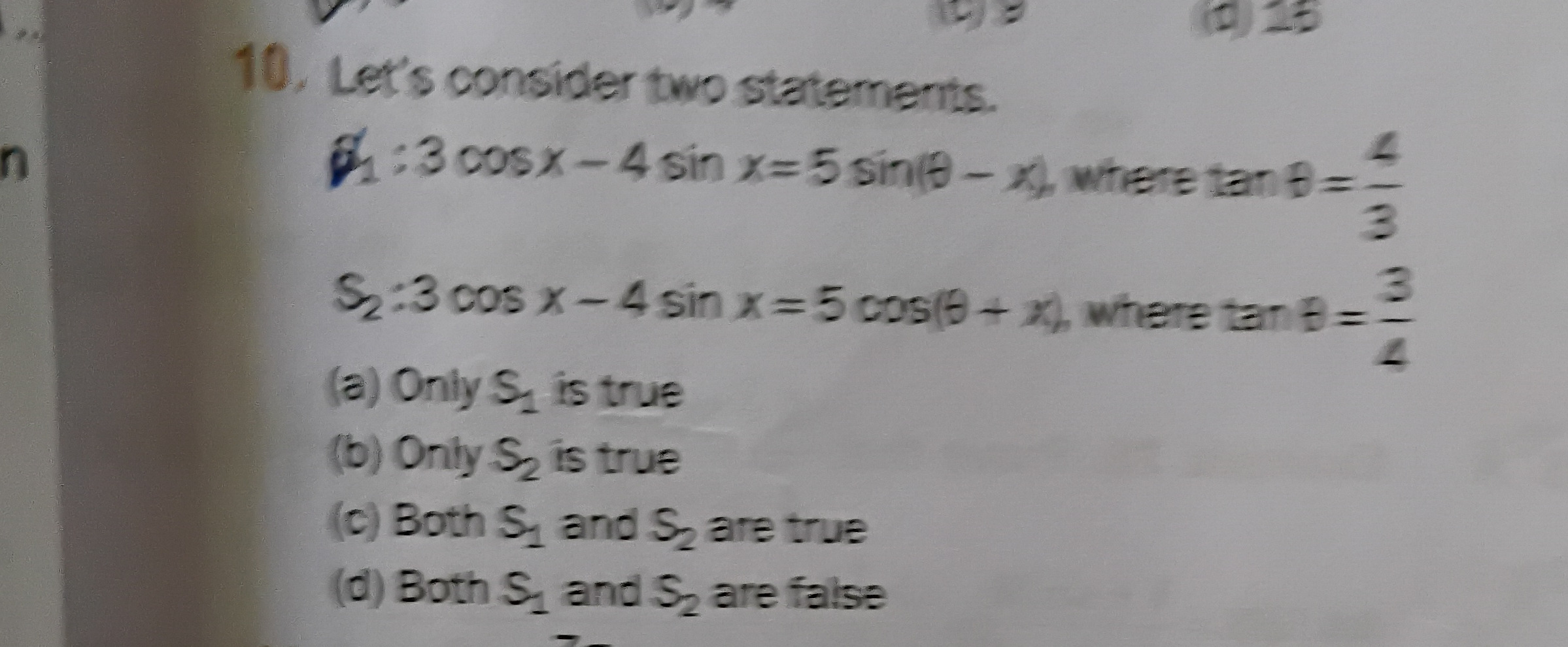Question
Question: Let's consider two statements. $S_1$ : 3cosx-4 sin x=5 sin($\theta$-x), where tan $\theta$ = $\frac{...
Let's consider two statements. S1 : 3cosx-4 sin x=5 sin(θ-x), where tan θ = 34 S2:3 cos x-4 sin x = 5 cos(θ+ x), where tan θ = 43

Only S1 is true
Only S2 is true
Both S1 and S2 are true
Both S1 and S2 are false
Both S1 and S2 are false
Solution
We analyze each statement separately.
Statement S1: 3cosx−4sinx=5sin(θ−x), where tanθ=34.
We can express acosx+bsinx in the form Rsin(ϕ−x). Let 3cosx−4sinx=Rsin(ϕ−x). Expanding Rsin(ϕ−x)=R(sinϕcosx−cosϕsinx). Comparing coefficients with 3cosx−4sinx: Rsinϕ=3 Rcosϕ=4
Squaring and adding these equations gives R2(sin2ϕ+cos2ϕ)=32+42, so R2=25, and R=5 (taking R>0). From Rsinϕ=3 and Rcosϕ=4, we get tanϕ=RcosϕRsinϕ=43. Thus, 3cosx−4sinx=5sin(ϕ−x) where tanϕ=43.
Statement S1 claims 3cosx−4sinx=5sin(θ−x) where tanθ=34. For S1 to be true, we would need 5sin(ϕ−x)=5sin(θ−x) for all x, with tanϕ=3/4 and tanθ=4/3. This implies ϕ=θ+nπ for some integer n. However, if tanϕ=3/4 and tanθ=4/3, then ϕ=θ+nπ. Therefore, S1 is false.
Statement S2: 3cosx−4sinx=5cos(θ+x), where tanθ=43.
Let 3cosx−4sinx=Rcos(ϕ+x). Expanding Rcos(ϕ+x)=R(cosϕcosx−sinϕsinx). Comparing coefficients with 3cosx−4sinx: Rcosϕ=3 Rsinϕ=4
Again, R=5. From Rcosϕ=3 and Rsinϕ=4, we get tanϕ=RcosϕRsinϕ=34. Thus, 3cosx−4sinx=5cos(ϕ+x) where tanϕ=34.
Statement S2 claims 3cosx−4sinx=5cos(θ+x) where tanθ=43. For S2 to be true, we would need 5cos(ϕ+x)=5cos(θ+x) for all x, with tanϕ=4/3 and tanθ=3/4. This implies ϕ+x=±(θ+x)+2kπ. If ϕ+x=θ+x+2kπ, then ϕ=θ+2kπ, which implies tanϕ=tanθ. This is not true as 4/3=3/4. If ϕ+x=−(θ+x)+2kπ, then 2x=−ϕ−θ+2kπ, which is not true for all x. Therefore, S2 is false.
Since both S1 and S2 are false, the correct option is (d).
